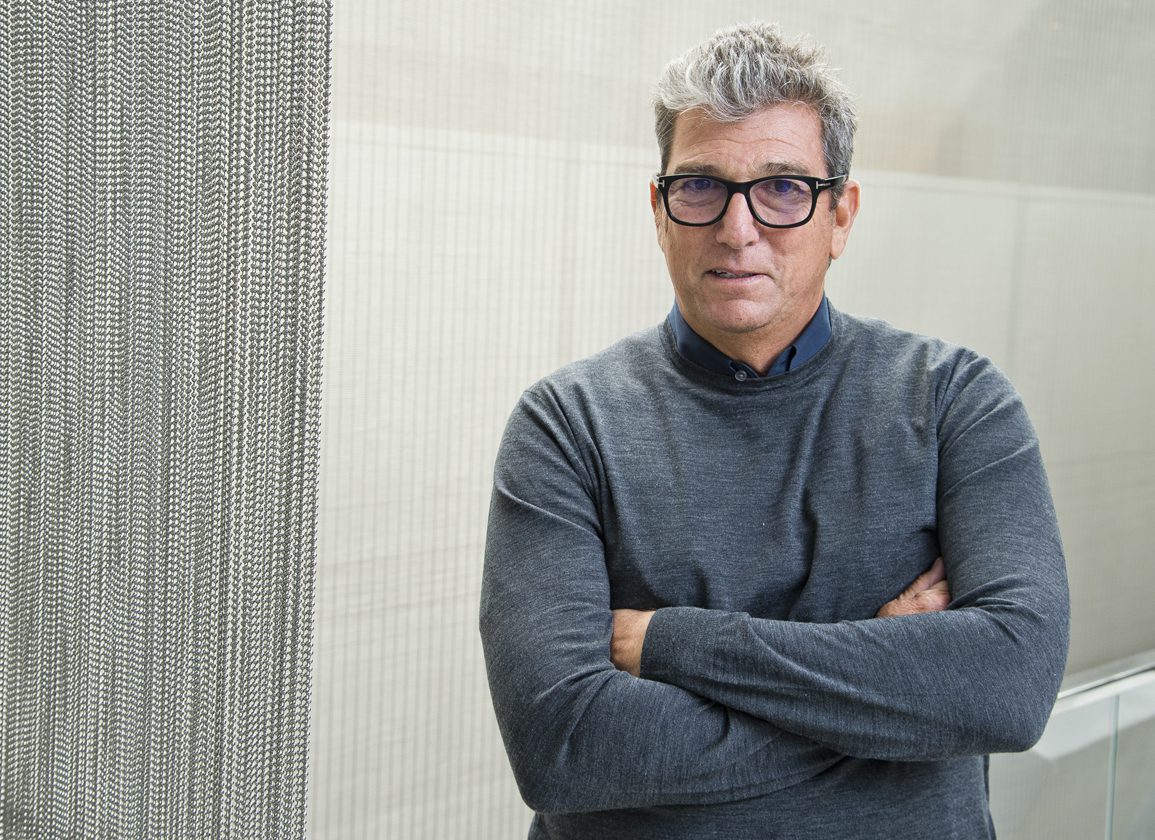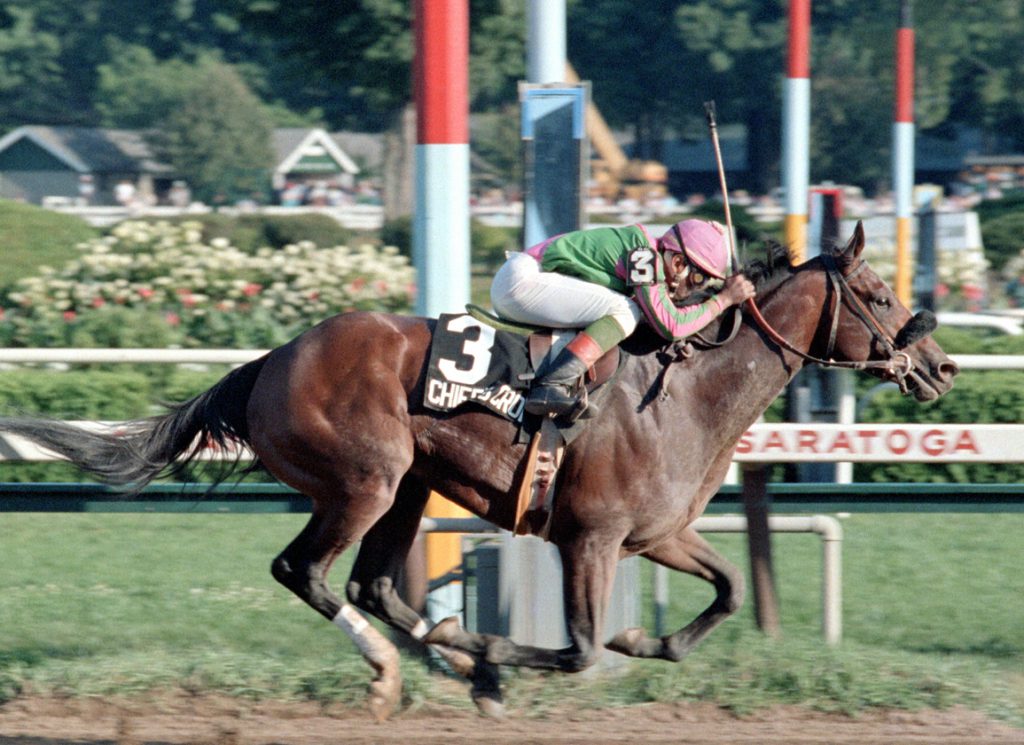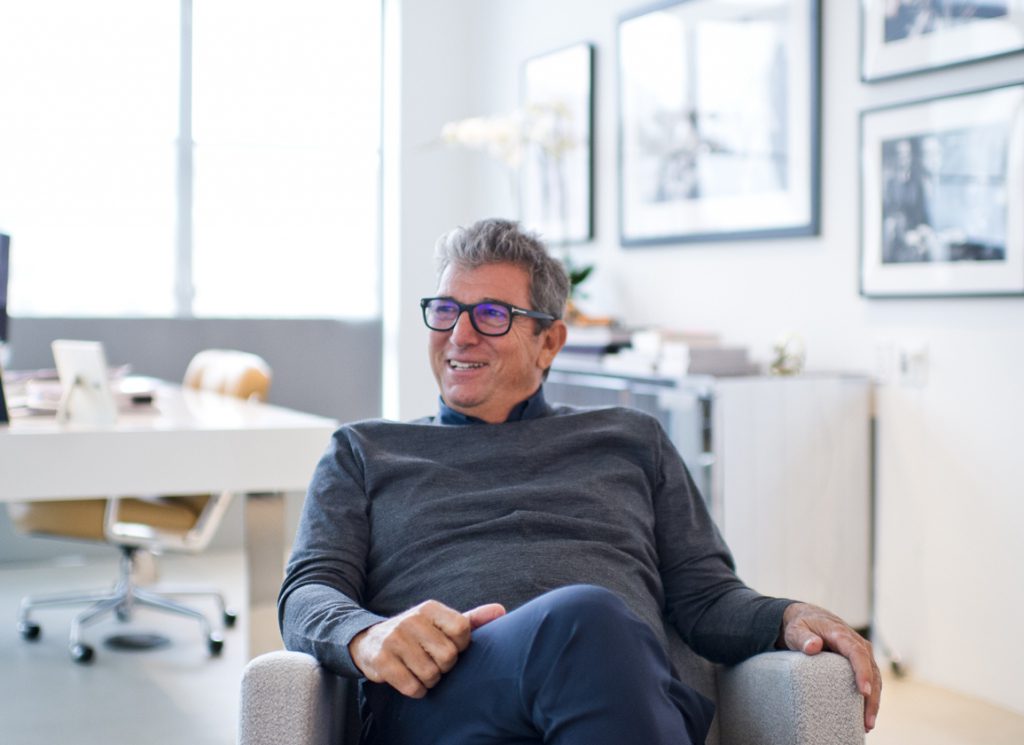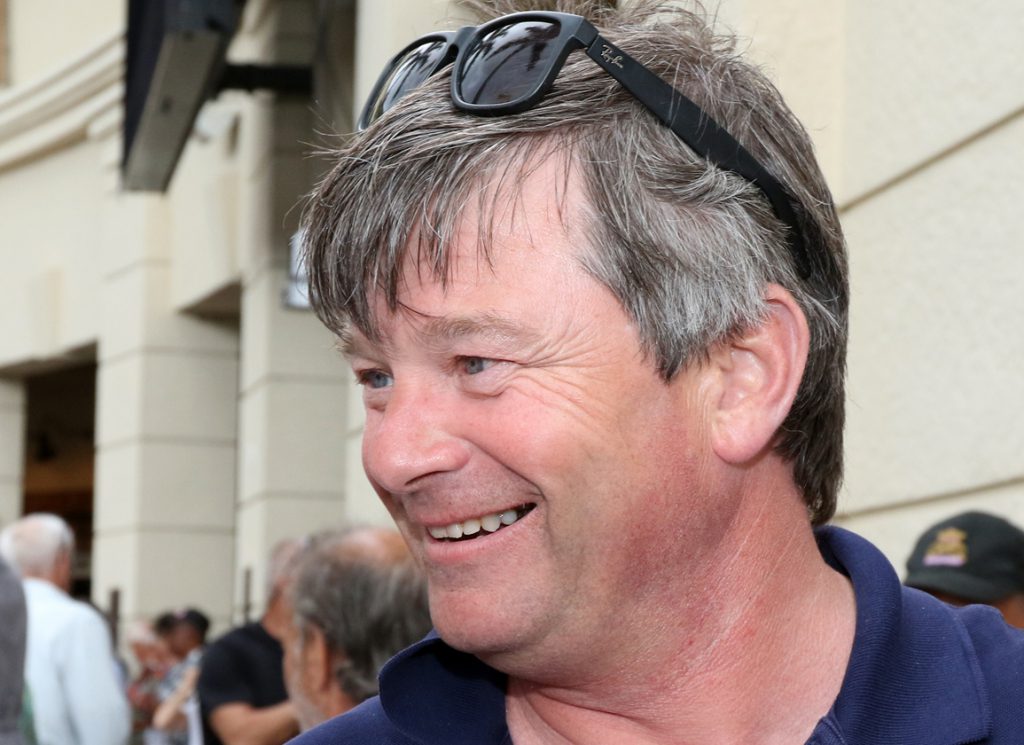By Chris McGrath
He was tailor-made for both walks of life; raised to be equally at home with the racetrack cavalcade, or the catwalk parade. From the outside, fashion and the Turf perhaps share their most obvious bond in pageant: all those shimmering silks, all those sleek creatures. To Andrew Rosen, however, it's a more internal thing. Outlook, not aspect.
In both cases, he explains, you're adding one plus one and hoping to get four. “Or six, or eight,” he says, smiling. “So, it's all about anticipating the future. In the clothing industry, you're always reading six, nine, 12 months ahead. In the horse industry it's even longer, because it's 11 months from conception to foal, and then a couple of years till they race. So there's always this thing that the future is going to be better than the past. You're going to find a better way to make this dress, or fit that jacket; you're going to find a way to produce a better racehorse. And that's just the way I was brought up, the way my mind works. I always believe that maybe the horses next year are going to run better than they did this year.”
He gives a shrug, another wry smile. “Sometimes they do,” he adds. “Most of the time they don't.”
Rosen inherited an aptitude for both these different worlds from his father Carl, who had turned the small Massachusetts dress company founded by his own father into fashion giant Puritan; and then, incredibly, made Hall of Famer Chris Evert (Swoon's Son) his first ever yearling purchase at Keeneland. His premature death, in 1983, created a challenging test of precocity in his 25-year-old son. In soon breaking out his own brand, however, Rosen would ultimately make the third Rosen generation in the trade the most successful yet. In the meantime, his parallel legacy on the Turf had already brought him to new heights virtually overnight.
Just weeks after losing his father, Rosen went to Claiborne and saw a Danzig colt, bred from Chris Evert's daughter by Secretariat, getting his basic training alongside the other yearlings. It was decided to name him for Rosen's father, who had been known throughout firm and family as “The Chief.”
“I remember looking at this colt with Seth [Hancock] and Roger Laurin, who was training the horses,” he recalls. “First crop of Danzig, a little on the small side but well-balanced. Who could have said, then, what was going to happen the next year? But I soon knew that something was different because Roger, before, was, 'Don't bother me, kid.' And then when Chief's Crown came around, all of a sudden, he was paying lots of attention to me! And actually, Roger and I ended up being amazing friends.
“Roger badly wanted to win the Kentucky Derby, because he should have won with Secretariat. He was the trainer of Meadow Stable when Eddie Neloy had a heart attack and died. Bull Hancock called him and said, 'You have a new job.' He had to give up his public stable to train for the Phipps family, but who wouldn't have done that? And he said, 'Well, okay, as long as my father can train these horses.' And that's how Lucien got to train Secretariat and Riva Ridge.”
In the event, Chief's Crown had to settle for third in the Derby, but it was nonetheless a remarkable and emotional journey for the whole Rosen family, with championship laurels secured in the inaugural GI Breeders' Cup Juvenile.
“Maybe in those days, so soon after Chris Evert, you didn't understand how hard it really was to have a horse of that caliber,” Rosen admits. “But he ran 21 races in two years and won eight Grade Is. That's unthinkable today. My father always wanted a Derby horse so something like Chief's Crown, that would have been the ultimate for him. He'd said to me, 'I don't want you to sell the horses, I think there's something special there.'”
Seasoned horsemen immediately recognized the caliber of the young heir, when the time came to syndicate Chief's Crown, and many cherished friendships have been maintained ever since. Rosen still talks most days with John Stuart of Bluegrass Thoroughbred Services, while a round of golf with Roger Laurin and Shug McGaughey identified a lasting successor once his first trainer retired.
“I have a lot of good relationships in the horse business,” Rosen says. “I understand the clothing industry: that's how I make my living. The horse racing, I'm still learning a lot. In both cases, it's what I grew up with, hanging out with my father. I would go with him to the factory or the office, and they're always talking about clothing. Same thing with the horses, though he was more into the gambling. He'd come home after a big day, and I'd be allowed to count the money and tell him how much he'd won. (And he'd give me $100!) So it was something that I just naturally gravitated towards, as I got older.”
Evidently his father made no more valued bequest than the counsel of his friend Miles Rubin, who did everything possible to redress the grievous void in a young man's life. But while plainly inheriting the same, uncommon acumen, Rosen's coolly confident and reflective nature has made him a contrasting if no less natural “chief” than his extrovert father.
“My father and I had a really great relationship,” he says. “Parenting in the '60s and '70s was not the same as today. But we had a connection: I understood how he thought, appreciated what he did, and learned so much from him. He died when he was young, and I was very young. But I'd had the opportunity to work with him, I'd been long exposed to what he did and thought, and that gave me a platform for the future.
“In some ways, I admire people that go off and do things very different from their family. But it felt like my responsibility to take over. I had a feel for the clothing business, and I had a feel for the horses. Everything was there for me, all I had to do was follow in my father's footsteps. And that's what I did, without ever looking back.
“I ask myself now, 'How the hell did I do that?' But my father was sick for a while, so he had prepared me as best as he could. And you're young, and bold, and confident. Sure, that there were things I did right and things I did wrong. But there's nothing I look back on and say, 'Oh, I should have done that differently.' Other than maybe when my mother called me the night before the Preakness and told me to change the jock!” (He couldn't do that, and Chief's Crown lost by a head.)
Going back to our opening premise, the common challenge both on the Turf and in couture is not merely to anticipate the future (i.e. demand) but to shape it, too. Is there perhaps some equivalence between breeding purely to sell and mass-producing cheap threads? Because surely, it's those who keep faith in quality who set standards, and ultimately set trends?
“I'm in the business I'm in because I love the clothing industry,” Rosen replies. “I want to do things that I'm proud of, and that people working for the company are proud of. I want to be able to inspire somebody. I'm not in that end of the clothing business which is just about finding a way to make money. I want to create something meaningful, part of the future of our industry. And I think it's a lot the same with breeding. I'm trying to produce horses that can run on Saturday.
“I understand that there's a market for everything. The clothing industry is huge. I focus on one part of it, try to be really good at that. And horseracing is another enormous industry. As many people have tried to own it, and control it, it just doesn't work that way. So, again, I try to focus on what I think works for what I believe in.”
This aspiration has prompted Rosen to develop a transatlantic program that needs to be curated with exceptional skill, given how the competition at that level tends to enjoy apparently infinite resources.
“I always had the relationships in America but had to develop them in Europe as well, because I wanted exposure to bloodlines over there,” he explains. “I always felt that the 2-year-old racing in Europe was much better. It started earlier and, because it was all on the turf and on the straight, it was safer. You could get more runs into a horse, and aid its development that way. The 2-year-old racing there is pretty open and can be competitive for everyone. But then, as the horses get older, I think the big outfits-the Godolphins, the Coolmores, the Juddmontes-have a huge advantage. As the racing heats up for the 3- and 4-year-olds, it's pretty tough to compete.”
On this model, the likes of Icon Project (Empire Maker) and Theyskens' Theory (Bernardini) have thrived Stateside after laying foundations on European grass. With the right material, however, Rosen is also happy to keep campaigning indigenous stock in Europe. Last year, for instance, in partnership with Marc Chan he celebrated Group 1 success with Lezoo (GB) (Zoustar {Aus}) and Prosperous Voyage (Ire) (Zoffany {Ire}).
Prosperous Voyage was actually recommended by trainer Ralph Beckett when her original owners were looking to cash out; while Lezoo was proposed at the Arqana Breeze-Up by another of Rosen's trusted collaborators, Jamie McCalmont.
Rosen told McCalmont that she would bring €300,000 after a breeze like that, and that would be too much. “Jamie looked at me and laughed,” he recalls. “Then Marc saw her and liked her, so we said we'd follow her through. None of us thought we would get her at that price [€110,000]. Then, before she ran first time, Ralph told us that this one wasn't very good. 'Oh well,' I said, 'We have to go through bad ones to get good ones…' So she has been a very pleasant surprise!”
Rosen is hardly alone in recognizing how Beckett has now sealed a place in the European elite, but remains a grateful admirer of Brian Meehan along with Andrew Balding, Roger Charlton and John Gosden. “Although really good horses can overcome everything, it's obviously best if you can have them managed them the right way, put them in the right spots and so on,” he says. “But I'm very lucky that way, and I like having these relationships with a few different people over there. In America, basically all the horses go to Shug first. The American system is very different. But the racing is very different, too. The Americans don't really understand Europe, and the Europeans don't really understand America!
“But listen, that kind of polarization creates opportunities. The Americans are strictly focused on dirt racing, yet 60 percent of their major racing is on turf. That's why Europe has benefited from so many of us coming over to support the yearling sales and the secondary market. In the old days you had Gainesway and Claiborne and others bringing those top turf stallions over, and I do believe that we're not far away from that kind of horse working again [in Kentucky]. Peter Brant, a few other people are trying. The only reason it hasn't happened yet is because none of them has worked. But it only takes one.”
As things stand, a little over half of Rosen's 30-odd horses in training are based in Europe; while he has 10 broodmares either side of the water, respectively divided between Watership Down and Kilshannig, in Europe; and Claiborne, Gainesway and Merriebelle in America. If you add young stock, you're looking at around 70 to 75 horses. But there's constant refinement: fillies retiring from one division to the other; other horses culled or sold to fund reinvestment.
“My philosophy is that I want to sell enough to cover the overhead of my operation,” Rosen explains. “Generally, I would always sell the colts, and sometimes fillies as well. My intention is for the horseracing to be a business, too. So, I have to do things that are commercially acceptable, and try to make the pieces fit together that way. But I wouldn't think of myself as a commercial breeder. Ultimately, what am I trying to do? Just develop good racehorses so I can have better broodmares. But that process requires me to sell horses, for sure. Because my operation would [otherwise] cost several million a year to run, and there has to be some logic to it.”
“Ultimately, you want your business to get a little bigger, a little better, each year. You're always looking at how to build. So, I am a commercial breeder to the extent that if I ever need to sell something, I want somebody always to be interested in what I have produced.”
As the conversation proceeds, it feels increasingly as though Rosen's twin enthusiasms share the same impetus: a dynamic, empathetic interest in where we find identity, and how we might cultivate it into something better. Maybe that drive traces to his grandfather, a Russian immigrant who was a cutter in a dress factory until launching this remarkable, dynastic engagement with American opportunity.
At one point, for instance, Rosen discusses efforts to preserve the historic identity of the Garment District in New York. He recently started a company where everything is manufactured locally. That's not easy, when Americans today are evidently reluctant to sit at a sewing machine all day, while expecting wages far in excess if those that suffice in other economies. But the quality Rosen seeks can't be produced by robots.
“I understand that this has to be more of a niche, that it's not for everyone,” he says of this domestic venture. “And I know it's never going to come back to what it was in the '60s and '70s. But I do think it's important to have a manufacturing base close to your design, because they go hand-in-hand. The closer they are, the better both are going to be. It's just like the countries that have the best stallions will also have the best horses. But to make these things happen, you need vision, passion, commitment. Without that, and without integrity-well, you won't ever keep something just because you always had it before.”
That last remark applies to us all, in that we all share the same patrimony, the same cumulative bequest from breeders past. But it also applies to Rosen on personal level, in terms of a passion inherited from his father.
“My early days in horseracing were so exciting,” he reflects. “First the Chris Evert times, with my father, and then all of us remembering him with Chief's Crown. There was no way I could not like it. And I have enjoyed it, all the way, with all the highs and lows. The lows haven't scared me, neither have the highs deceived me into thinking it's always going to be that way. I have always just really enjoyed it all: not only the racing and the breeding, and the trading, but above all the people.”
Not a subscriber? Click here to sign up for the daily PDF or alerts.









